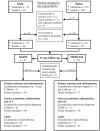Comparison of glucose metabolism and anthropometry in women with previous gestational diabetes treated with metformin vs. insulin: 9-year follow-up of two randomized trials
- PMID: 35274295
- PMCID: PMC9564449
- DOI: 10.1111/aogs.14343
Comparison of glucose metabolism and anthropometry in women with previous gestational diabetes treated with metformin vs. insulin: 9-year follow-up of two randomized trials
Abstract
Introduction: The main aim was to study whether the long-term incidences of type 2 diabetes, pre-diabetes and metabolic syndrome differed between women who were treated with metformin or insulin for gestational diabetes.
Material and methods: This 9-year follow-up study of two open-label randomized trials compares metformin and insulin treatments of gestational diabetes. In all, 165 women, 88 previously treated with insulin and 77 treated with metformin in the index pregnancy, were included in the analyses. An oral glucose tolerance test was performed, and measures of anthropometry, glucose metabolism, serum lipids and inflammatory markers were compared between the treatment groups. Disorders of glucose metabolism (pre-diabetes and type 2 diabetes) at the 9-year follow-up was the primary outcome of this study. This study was registered at ClinicalTrials.gov: NCT02417090.
Results: The incidences of pre-diabetes and type 2 diabetes (40.3% vs. 46.6%, odds ratio [OR] 0.77, 95% CI 0.40-1.50, p = 0.51), type 2 diabetes (14.3% vs. 15.9%, OR 0.88, 95% CI 0.34-2.26, p = 0.94), pre-diabetes (26.0% vs. 30.7%, OR 0.79, 95% CI 0.38-1.65, p = 0.62), and metabolic syndrome (45.9% vs. 55.2%, OR 0.69, 95% CI 0.35-1.35, p = 0.31) were comparable between the metformin and insulin groups. Moreover, there were no evident differences in the individual measures of anthropometry, glucose metabolism including HOMA-insulin resistance, serum lipids or inflammatory markers between the two treatment groups.
Conclusions: Treatment of gestational diabetes with metformin vs. insulin during pregnancy is unlikely to have diverging long-term effects on maternal anthropometry, glucose metabolism or serum lipids. From this perspective, both treatments may be considered in gestational diabetes.
Keywords: gestational diabetes; insulin; metabolic syndrome; metformin; type 2 diabetes.
© 2022 The Authors. Acta Obstetricia et Gynecologica Scandinavica published by John Wiley & Sons Ltd on behalf of Nordic Federation of Societies of Obstetrics and Gynecology (NFOG).
Conflict of interest statement
None.
Figures
References
-
- Yuen L, Saeedi P, Riaz M, et al. Projections of the prevalence of hyperglycaemia in pregnancy in 2019 and beyond: results from the International Diabetes Federation Diabetes Atlas, 9th edition. Diabetes Res Clin Pract. 2019;157:107841. - PubMed
-
- Langer O, Yogev Y, Most O, Xenakis EMJ. Gestational diabetes: the consequences of not treating. Am J Obstet Gynecol. 2005;192:989‐997. - PubMed
-
- HAPO Study Cooperative Research Group , Metzger BE, Lowe LP, et al. Hyperglycemia and adverse pregnancy outcomes. N Engl J Med. 2008;358:1991‐2002. - PubMed
-
- Lauenborg J, Mathiesen E, Hansen T, et al. The prevalence of the metabolic syndrome in a Danish population of women with previous gestational diabetes mellitus is three‐fold higher than in the general population. J Clin Endocrinol Metab. 2005;90:4004‐4010. - PubMed


